I have previously studied gender representation across all acting roles (see Do films directed by women have more women in the cast?), so today I will zero in on particular jobs, as revealed by the credit the actor received.
I identified 41 jobs that appear most frequently in movie credits, such as dancer, police officer, reporter, doctor, and detective. I then identified all the credited uses and the gender of the person playing that role. You can read more about my methodology at the end of the article.
This data gives us a fascinating insight into what roles filmmakers are willing to give to women, and how that is shifting over time.
Women on the rise
In the first half of the 20th century, it was very rare to see a female police officer on screen. Since then, an increasing number of women actors have been hired to police the big screen, peaking at just over 15% of roles in films released between 2020 and 2023
Likewise, women have increasingly been hired to play other professional roles such as professor, doctor and photographer.
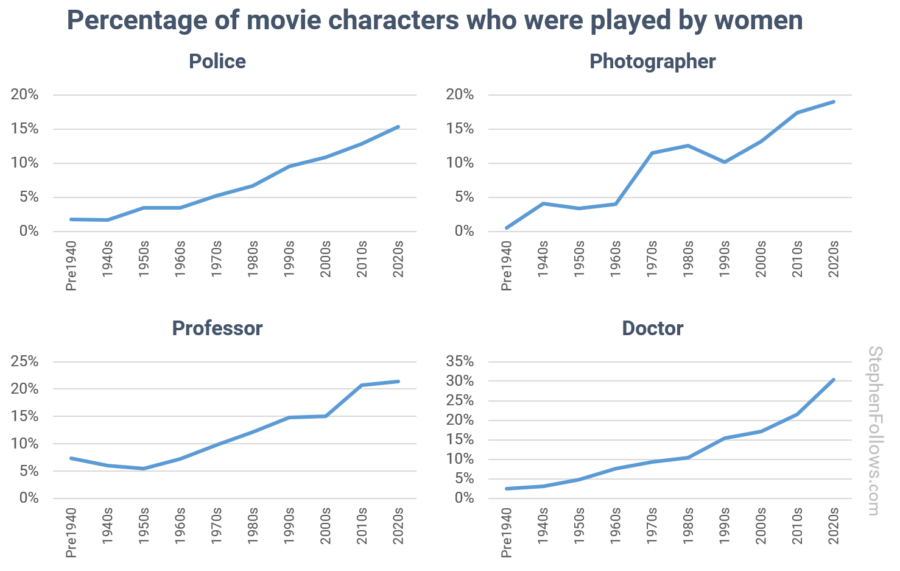
The late bloomers
Some jobs held out longer than others, with a handful only starting to increase their gender representation towards the end of the century. These include detectives (such only started seeing meaningful rises from the 1980s), bartenders (1980s), and reporters (1970s).
The same can be said for waiters (1990s), albeit this might also have something to do with the increase in the gender-neutral use of the term, as prior to that, the same on-screen character may have been credited as a waitress.
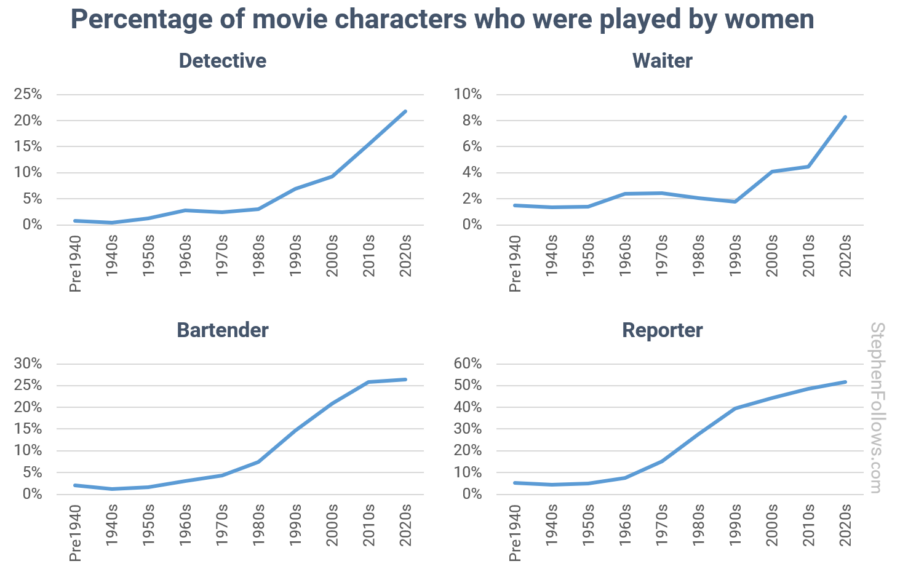
The flatliners
Not all jobs have seen an increase in women playing them. Some roles have had high numbers of women playing them since the dawn of movies. These include dancers, teachers, tourists and receptionists.
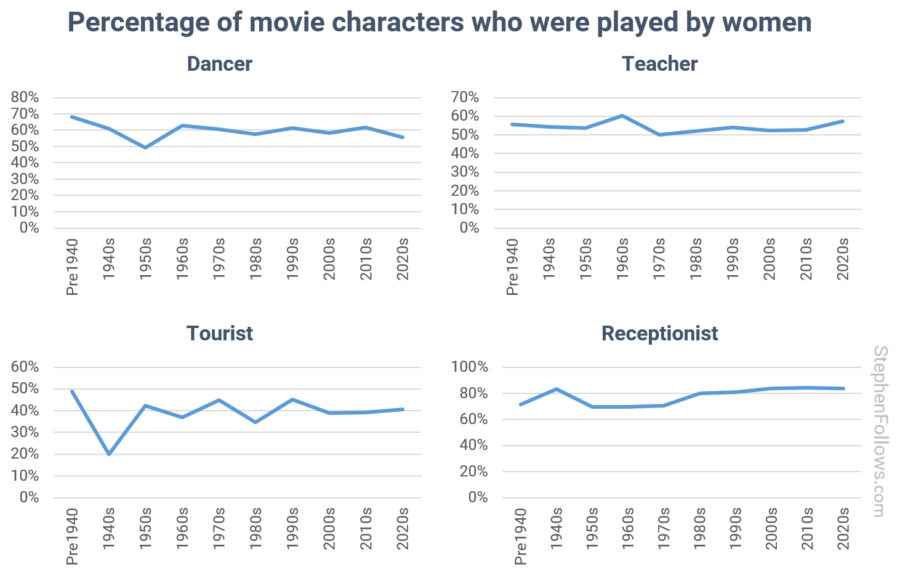
Are there any jobs in which women are becoming less represented?
Across all the jobs I examined, only one saw a clear decline in the percentage of women hired to play them – nurses.
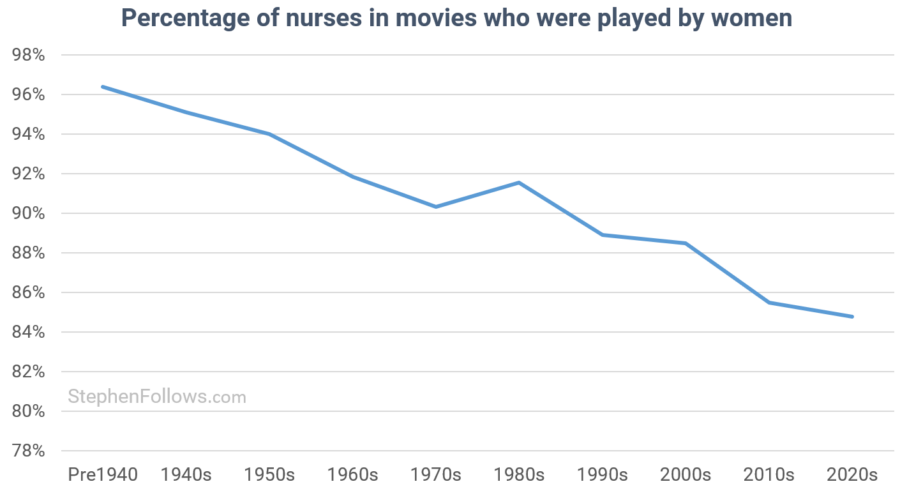
Types of movies
In most cases, the genre of the movie did not significantly affect the gender representation of the roles I looked at.
However, in a few cases, the differences were stark. For example, almost half of the journalists in sci-fi movies are played by women, compared with under 16% of journalists in sports movies. Similarly, judges in Westerns are almost never women, compared with over a third of judges in sci-fi movies.
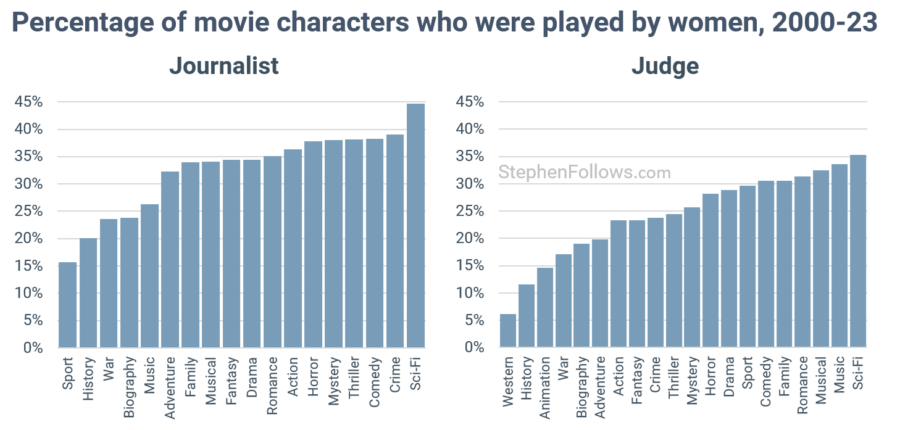
Notes
Today’s research looks at 632,683 cast credits in all movies ever made, specifically those related to one of the 41 jobs I identified as common in movies. This includes both generic credits (e.g., “Dancer”) and named characters where the job is clear (e.g., “Professor McGonagall”).
The data came from OMDb, Wikipedia, IMDb, The Numbers and my own databases. Gender was determined by pronouns in biographies, online classifications (e.g. some movie databases spit ‘actors’ and ‘actresses’) and my past work on gender. I have split the gender stats into two categories as this reflects the way data has been captured over the period I studied. In the future, there may be more nuanced databases which capture gender fluidity and non-binary identities, but until then, we’re left with a rather crude binary approach. I used the gender the person currently publicly identifies as. I am always looking for better and more detailed ways to study and report on gender. If you think I can do better, reach out and we can chat.


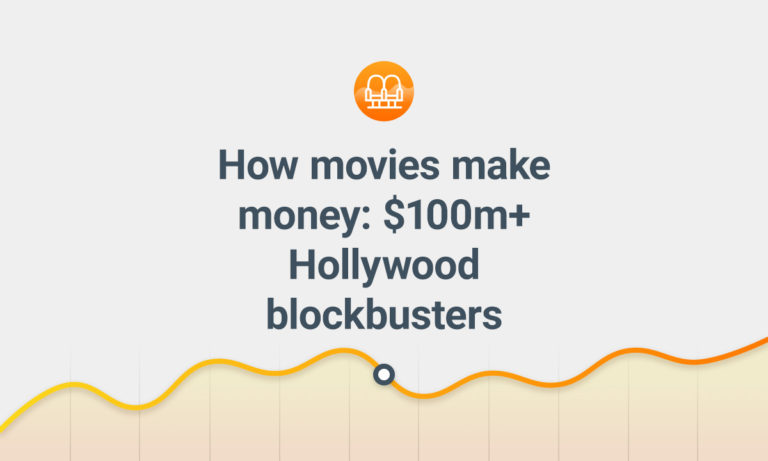
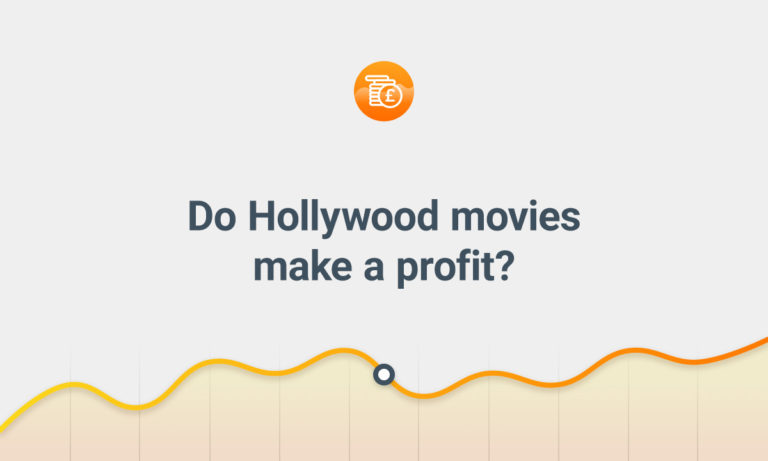

Comments
Hi Stephen, I’d like to bring your attention to the underlying sexism in the title of this article. I understand what information and statistics you’re presenting, and it’s interesting to see this change in statistics, but using the phrase “what jobs are women allowed to do in movies” makes it seem like inherently women are needing to be given permission to fulfill those roles or jobs. This is a patriarchal view over women’s autonomy and ability to exist in a world where they have control over their own lives and make choices for themselves. What you’re trying to present here is “what jobs are female actors being cast in more frequently”. Also using the phrase “what roles filmmakers are willing to give to women” suggests subconsciously that the filmmakers are all male. I think the deeper layer of this article is to look at these films that you took the statistics from and see what the gender identity of the directors of these films are. Are male directors casting more women? Or is this change because there are more female directors who are casting more women in these types of job roles in films?
Hi Sienna,
Thank you for your comment and your point of view. I 100% agree. I wanted to find a title that conveys the patriarchal nature of the film industry and how a small number of (mostly male) gatekeepers control the narratives that we, as audience members, have available to us.
The choice of the casting of these roles is incredibly revealing and highlights the deeply sexist, patriarchal image of the world that movies present, despite claiming to just be reflecting the world. The lens these gatekeepers place on the stories they tell is not overtly stated but nonetheless is all pervasive.
When looking for a title, I wanted to reflect this, and to elicit anger in readers towards nature of the entire system.
On this blog I try to just state the facts, leaving the commentary for others to do, or for me to do in other forms. But on this topic I struggled to find a dispassionate way of describing it which didn’t underplay the scale of the sexism at play. Therefore, I opted for title that I feel frames things the way they plainly are.
You raise a good point about the gender of the director having a influence. I have looked at that before (link is in the opening paragraph of the article) and found that is is true that a women director is more liekly to lead to a higher than average number of women in the cast.